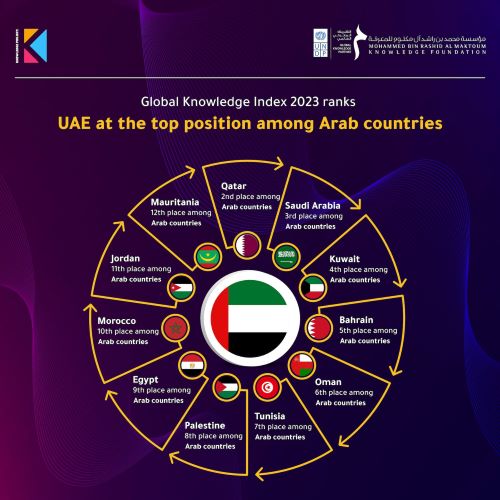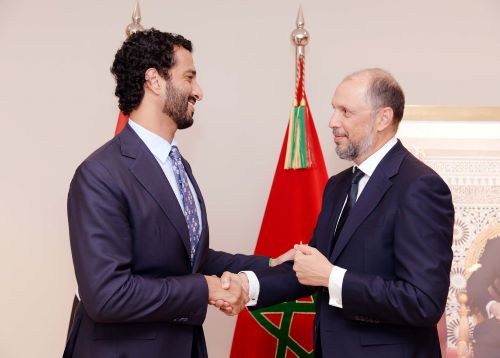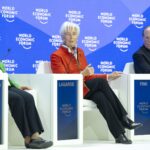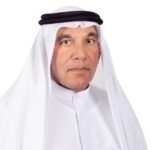Global Knowledge Index 2023 ranks UAE at the top position among Arab countries

The Mohammed bin Rashid Al Maktoum Knowledge Foundation (MBRF) previewed the rankings of Arab countries in the Global Knowledge Index (GKI) 2023.
Revealed by the United Nations Development Programme (UNDP) in collaboration with the MBRF, these rankings highlighted the UAE as a leading performer among Arab states in the GKI 2023. The announcement was made at the eighth edition of the Knowledge Summit held at the Dubai World Trade Centre under the theme ‘Knowledge Cities and the Fifth Industrial Revolution.’
In a panel discussion titled ‘Building knowledge cities together: UNDP and MBRF partnership for the 5th industrial revolution’, His Excellency Jamal bin Huwaireb, CEO of the MBRF, joined in the announcement of the details regarding the rankings of the GKI 2023. Khaled Abdel Shafi, Director of the Regional Hub for Arab States, UNDP; and Dr. Hany Torky, Chief Technical Adviser and Project Manager, Knowledge Project, UNDP, also participated in the session.
The UAE secured the top position among Arab countries in the GKI 2023, which covered a total of 133 countries, including 12 Arab states. The GKI evaluates 155 variables sourced from over 40 international databases. Qatar claimed the second spot, followed by the Kingdom of Saudi Arabia in third place. Kuwait, Bahrain, and Oman secured the fourth, fifth, and sixth positions, respectively. Tunisia, Palestine, Egypt, and Morocco claimed the seventh to tenth rankings, while Jordan and Mauritania secured the eleventh and twelfth spots. The UAE stands out as a leading performer, particularly in terms of its knowledge infrastructure.
Arab Countries’ Areas of Strength
The GKI 2023 shed light on the strengths and areas requiring improvement in Arab countries, aiming to narrow the existing divide. The UAE exhibits strengths in various aspects, particularly in metrics such as active mobile broadband subscriptions per hundred inhabitants, mobile upload and download speeds, educational attainment (bachelor’s degree or equivalent), entrepreneurial employee activity rate, and the percentage of individuals with standard ICT skills. These strengths underscore the UAE’s exceptional performance in areas such as the internet, education, human resources, communications, and information.
Qatar claimed the second position among the Arab countries in the GKI, showcasing significant strengths across various fields, including the GERD per researcher, the unemployment rate with advanced education, the vulnerable employment rate, the share of TVET occupations, and the unemployment rate among individuals with vocational education. These strengths are predominantly concentrated in the research and development sector, as well as in human resources, education, and training.
The Kingdom of Saudi Arabia showcased strong performance in diverse domains. The strengths of KSA include a high percentage of individuals possessing standard ICT skills, the state of cluster development, the growth of innovative companies, the percentage of firms with products and services new to the market, and the percentage of households with internet access at home. These strengths are associated with the information and communications technology sectors, as well as production and internet-related fields.
In the GKI 2023, Kuwait secures the 4th position among Arab states, showcasing strength in various key areas, including industry and service value added (% GDP), fixed broadband internet traffic per subscription, pupil-trained teacher ratio in pre-primary and primary education, as well as the vulnerable employment ratio. These strengths underscore Kuwait’s impressive achievements in sectors like industry, services, primary education, and employment.
Egypt’s strengths are prominently focused on higher education, production, and research. This includes exceptional female-to-male teacher ratios in tertiary education, market concentration, firms introducing new products and services to the market, the status of cluster development, and the citations per document.
In Morocco, strengths were observed in the poverty headcount ratio, industrial design applications per 100 billion GDP, and the percentage of researchers in higher education. Additionally, other strengths include the percentage of government expenditure on secondary and primary education (% GDP). These indicators highlight promising prospects for the industrial, research, and educational sectors.
The GKI serves as a valuable and practical tool for evaluating the global knowledge landscape. It offers valuable insights into the challenges encountered in the field of sustainable and knowledge-based development. Comprising seven sub-indices, the GKI assesses the performance of six pivotal knowledge sectors, including pre-university education, technical education and vocational training, higher education, information and communication technology (ICT), research, development and innovation, and the economy. Moreover, an Enabling Environment sub-index captures the social, political, economic, health, and environmental contexts that influence these sectors.
Last Updated on 11 months by News Desk 1













